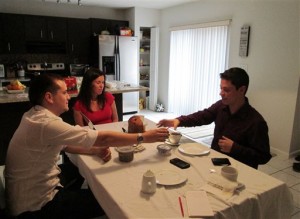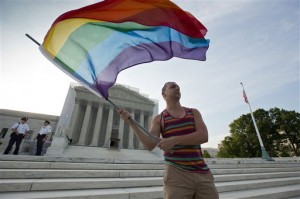Immigration, gay marriage and a nation’s change
By: Associated Press//December 31, 2014//
By LAURA WIDES-MUNOZ
Associated Press

MIAMI (AP) — On a bright New Year’s Day in 2010, a small group of immigrants including a young couple in love laced up donated sneakers for a 1,500-mile march from Miami to Washington.
The goal was simple: To call attention to the plight of youth like themselves living in the United States illegally, and to urge President Barack Obama to issue a temporary reprieve from deportation for millions of these young immigrants.
Dozens of relatives and friends gathered round. Juan Rodriguez silently put a hand on Felipe Sousa Matos’ back, steadying his boyfriend. Matos’ older sisters, one who was also in the country illegally, burst into tears. “Promise you’ll come back,” they said, afraid of what awaited the youths along the back roads of the rural South.
It’s easy to forget how much has changed since that walk dubbed the “Trail of Dreams,” which generated headlines from South America to Asia. Five years ago, the immigration movement was stalled, many viewed the youths’ quest as a pipe dream, and same-sex marriage was legal in just a few states.
Florida is set next week to become the 36th state to recognize same-sex marriage. On the immigration front, Obama issued a deportation reprieve in 2012 for millions of youth, and he followed that up in November by expanding the order to cover millions more teens and adults.
As for Matos, who now goes by Sousa-Rodriguez, he and Rodriguez have become leaders in the immigration movement, are married and hope one day to have a family of their own.
Their story is at once a modern American romance and a sign of just how far and how fast this country has moved on two of the most controversial issues of our time.
On the trail that first day, the 23-year-old Sousa-Rodriguez couldn’t begin to imagine the changes that lay ahead. He was terrified how strangers would react to his budding relationship with Rodriguez, 20, worried they might be attacked. By the time the group reached the small, Haitian church where they would spend the night, afternoon showers had soaked his shoes, and blisters covered his feet.
Rodriguez reminded him why they were walking. They’d tried letter-writing campaigns, organized local protests to raise attention about Obama’s stepped-up deportations. But few in Washington seemed to want to deal with the millions of youths whose parents had brought them to the United States.
In the following weeks, the couple and fellow marchers Gabby Pacheco and Carlos Roa visited historic civil rights landmarks across the South. The nonprofit Florida Immigrant Coalition provided a van to accompany them. At each stop they told their stories. Rodriguez, a Colombian, had been fifth in his graduating high school class in Broward County but initially had to work as a janitor because of his immigration status until his stepmother successfully petitioned for him. Sousa-Rodriguez had been sent to the U.S. by his mother and was now struggling to finish his bachelor’s degree, fearful any chance encounter with police could end with him being deported to the impoverished suburbs of Rio.
Yet even as the youths grew more confident “coming out” about their immigration status, Rodriguez and Sousa-Rodriguez found themselves back in the closet when it came to their sexuality. At a community center in Virginia, immigrant advocates and volunteers helping with logistics asked the two not to hold hands or display any affection during the event to avoid problems with conservative allies. Reluctantly, they agreed.
“It was supposed to be liberating. ‘I’m here to tell you my story,'” Sousa-Rodriguez recalled. “But I couldn’t tell them my story.”
Roa, now an architecture student at the Illinois Institute of Technology, says that moment helped him understand the dual challenges his friends faced.
“On the one end they’re coming out, and on the other end, they’re being shut down,” he said.
The four-month march spawned similar walks around the country and inspired other youths to come out about their immigration status. When the quartet arrived in Alexandria, Va., in late April, parents of other young immigrants lined the streets to welcome them. The four left their sneakers at the White House fence.

And yet little changed as far as policy. Obama maintained that a deportation reprieve was beyond his authority, and opponents of amnesty for youths like Sousa-Rodriguez argued it would only encourage more illegal immigration.
Sousa-Rodriguez and the other marchers now played national roles in the immigration movement, particularly with the youth-led United We Dream; Rodriguez met Obama at the White House.
Back in Miami, they returned to college even as they continued their activism. Sousa-Rodriguez graduated in business but increasingly felt burned out. He now saw immigrant rights as only one part of a web of civil rights issues, including the treatment of the LGBTQ community. To make matters more complicated, he was ready to commit. Rodriguez wasn’t. They still argue about who proposed first.
“Felipe tried to propose a million times.”
“No I didn’t. I just needed to know where things were headed.”
Sousa-Rodriguez wondered if it was time to move on.
Then, one night on a 2011 New Year’s trip to Charleston, S.C., Rodriguez led his boyfriend to the steps of the local office of the U.S. Department of Homeland Security. He got down on one knee.
The two married that spring in Boston — with a raucous party in Miami because same-sex marriage was not yet legal in Florida. They wed a month before Obama announced a temporary halt to deportations for qualified immigrant youth, and before Sousa-Rodriguez started a new job with the LGBTQ civil rights group GetEqual.
By then, Rodriguez had become a legal permanent resident and filed for citizenship. But his timing was off. He filed days before the U.S. Supreme Court overturned a federal law that essentially defined marriage as between a man and a woman, meaning Rodriguez couldn’t get his new husband a green card.
“Welcome to the U.S. You are going to be a citizen — but not equal,” Rodriguez thought when he saw the form listing him as single.
The day of his swearing-in was bittersweet. The couple had moved to Tampa, where Rodriguez was finishing a degree in sociology. Sousa-Rodriguez cheered for his husband, who now goes by Isabel. Afterward, they stared in disbelief at Rodriguez’s citizenship certificate. Flush left, in all caps, was the word “MARRIED.”
In spring 2014, Rodriguez helped win in-state college tuition for Florida students living in the country illegally, while Sousa-Rodriguez returned full-time to national immigrant advocacy work.
“I felt like just because I was protected, I couldn’t stop fighting. My sister still worried every day about deportation,” he said.
In November, she joined millions of parents of U.S.-born children who qualified for Obama’s temporary reprieve.
Two days after Christmas, Sousa-Rodriguez was writing his grocery list at the modest apartment he shares with Rodriguez when he got a text message from the U.S. government. His green card was finally approved. Follow @lwmunoz
Legal News
- Wisconsin joins Feds, dozens of states to hold airlines accountable for bad behavior
- Trump ahead of Biden in new Marquette poll
- Bankruptcy court approves Milwaukee Marriott Downtown ‘business as usual’ motion
- New Crime Gun Intelligence Center to launch in Chicago
- Arrest warrant proposed for Minocqua Brewing owner who filed Lawsuit against Town of Minocqua
- Wisconsin Supreme Court justices question how much power Legislature should have
- Reinhart named the 2024 Wisconsin law firm of the year by benchmark litigation
- Milwaukee’s Common Council now has the most African Americans, women and openly LGBTQ members ever
- Office of School Safety Provides Behavioral and Threat Assessment Management Training Ahead of 25th Anniversary of Columbine Shooting
- Wisconsin Supreme Court to hear arguments in Democratic governor’s suit against GOP-led Legislature
- Lawsuit asks Wisconsin Supreme Court to strike down governor’s 400-year veto
- Wisconsin man pleads not guilty to neglect in disappearance of boy
WLJ People
- Power 30 Personal Injury Attorneys – Russell Nicolet
- Power 30 Personal Injury Attorneys – Benjamin Nicolet
- Power 30 Personal Injury Attorneys – Dustin T. Woehl
- Power 30 Personal Injury Attorneys – Katherine Metzger
- Power 30 Personal Injury Attorneys – Joseph Ryan
- Power 30 Personal Injury Attorneys – James M. Ryan
- Power 30 Personal Injury Attorneys – Dana Wachs
- Power 30 Personal Injury Attorneys – Mark L. Thomsen
- Power 30 Personal Injury Attorneys – Matthew Lein
- Power 30 Personal Injury Attorneys – Jeffrey A. Pitman
- Power 30 Personal Injury Attorneys – William Pemberton
- Power 30 Personal Injury Attorneys – Howard S. Sicula











